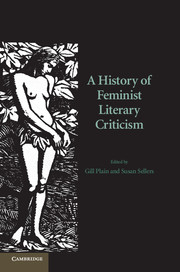Book contents
- Frontmatter
- Contents
- Acknowledgements
- Notes on contributors
- Introduction
- PART I PIONEERS AND PROTOFEMINISM
- PART II CREATING A FEMINIST LITERARY CRITICISM
- PART III POSTSTRUCTURALISM AND BEYOND
- Introduction to Part III
- 12 Feminist criticism and poststructuralism
- 13 Feminist criticism and psychoanalysis
- 14 French feminist criticism and writing the body
- 15 Postcolonial feminist criticism
- 16 Feminist criticism and queer theory
- 17 Feminist criticism and technologies of the body
- Postscript: flaming feminism?
- Index
- References
14 - French feminist criticism and writing the body
Published online by Cambridge University Press: 05 June 2012
- Frontmatter
- Contents
- Acknowledgements
- Notes on contributors
- Introduction
- PART I PIONEERS AND PROTOFEMINISM
- PART II CREATING A FEMINIST LITERARY CRITICISM
- PART III POSTSTRUCTURALISM AND BEYOND
- Introduction to Part III
- 12 Feminist criticism and poststructuralism
- 13 Feminist criticism and psychoanalysis
- 14 French feminist criticism and writing the body
- 15 Postcolonial feminist criticism
- 16 Feminist criticism and queer theory
- 17 Feminist criticism and technologies of the body
- Postscript: flaming feminism?
- Index
- References
Summary
This chapter will first take an historical perspective on writing the body in the context of ‘French feminism’, considering what was at stake in writing the body in the 1970s and 1980s. The very expressions ‘writing the body’ and ‘French feminism’ pull us in the direction of the Anglophone reception of the work of Hélène Cixous, Luce Irigaray and Julia Kristeva. I shall analyse the main charges made against this work, and conclude by asking what positive and productive readings of this work are now possible. This will incorporate a brief consideration of some more recent work by these three women writers.
TERMINOLOGY
Both ‘writing the body’ and ‘French feminism’ are expressions used, at least in the Anglophone critical community, as shorthand to refer almost exclusively to writings by Cixous, Irigaray and Kristeva. These three authors are brought together for the convenience of our scholarly drive to categorise, and yet they do not present themselves as having anything in common with each other. This article will be no exception since it is engaging with reception as much as with the texts themselves – in such ways are traditions sustained. At the same time commentators on these writers rarely consider them in fruitful dialogue with other women contemporaries. Occasionally other women such as Annie Leclerc or the Canadian Madeleine Gagnon are included, but the ‘Holy Trinity’ (Moi, 1985) is most commonly considered as if unique albeit representative.
- Type
- Chapter
- Information
- A History of Feminist Literary Criticism , pp. 263 - 281Publisher: Cambridge University PressPrint publication year: 2007
References
- 2
- Cited by



